Could the Majdal Shams Stadium Disaster Lead to All-Out War Between Israel and Hezbollah?
BEIRUT/DUBAI: Israel's security cabinet has given Prime Minister Benjamin Netanyahu and Defense Minister Yoav Galant the go-ahead to take retaliatory action for Saturday's rocket attack on a football stadium in the Druze Arab village of Majdal Shams in the Israeli-occupied Golan Heights that killed 12 children.
According to the Israeli military, Mazdal Shams was hit by an Iranian-made Falak-1 rocket with a 50-kilogram warhead, launched by the Iran-backed Hezbollah militia in Lebanon. The United States also supported this conclusion.
Hezbollah, which has been engaged in regular cross-border gunfire with Israel since the Gaza war began on October 7, has denied any involvement in the incident but confirmed it fired one such rocket at an Israeli military target in the Golan on Saturday.
In a statement, they said, “The Islamic Resistance has absolutely no involvement in this incident and categorically denies all false allegations related to it,” and blamed the deaths on a failed Israeli interceptor missile.
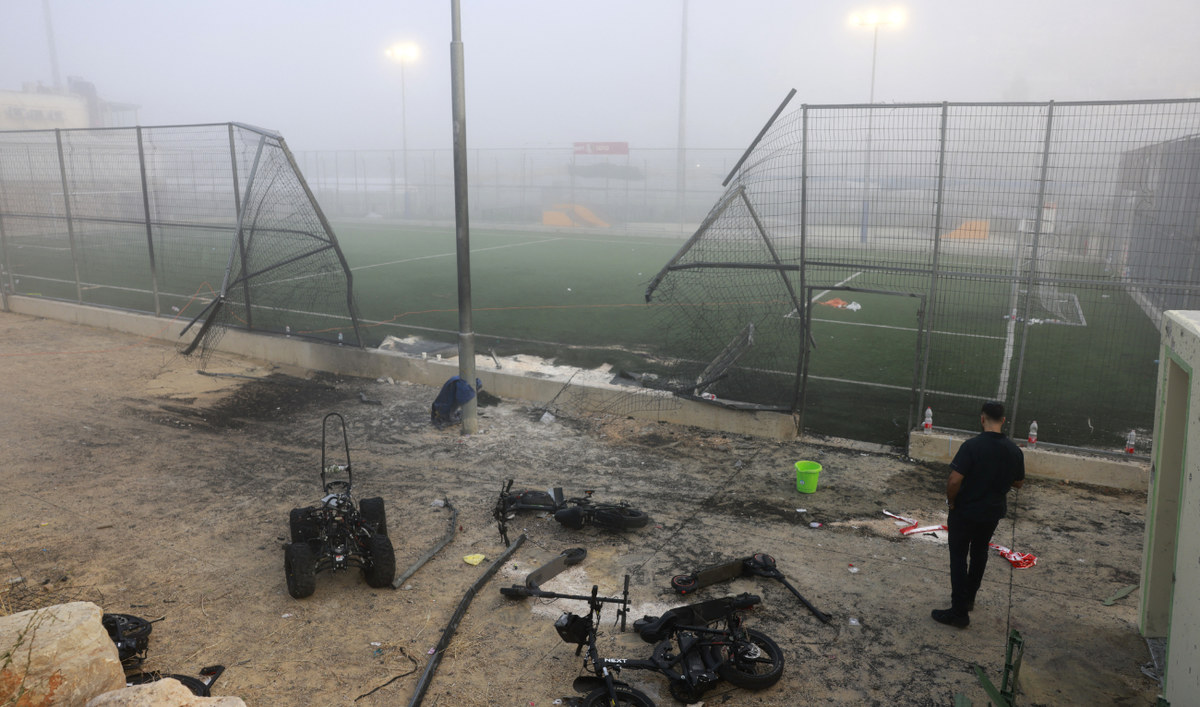
A man stands near a damaged gate around a soccer field after an airstrike from Lebanon in the village of Majdal Shams in the Israeli-annexed Golan Territory on July 28, 2024. (AFP)
The Majdal Shams incident followed an Israeli airstrike in southern Lebanon that killed four Hezbollah fighters, prompting the militia to launch retaliatory rocket attacks on the Golan Heights and northern Israel.
Mohanad Hage Ali, a senior fellow at the Carnegie Middle East Center in Beirut, said in a post on the social media platform X that the rockets may have been fired accidentally by Hezbollah or its allies, including the al-Fajr Army and the al-Qassam Brigades.
He said that regardless of what happened, “in every case the massacre provided the Netanyahu government with an excuse to respond with force.”
Netanyahu, who returned early from a visit to the United States, immediately attended a security cabinet meeting and told local media that “Hezbollah will pay a heavy price for this attack,” adding that it was “a price they have never paid before.”
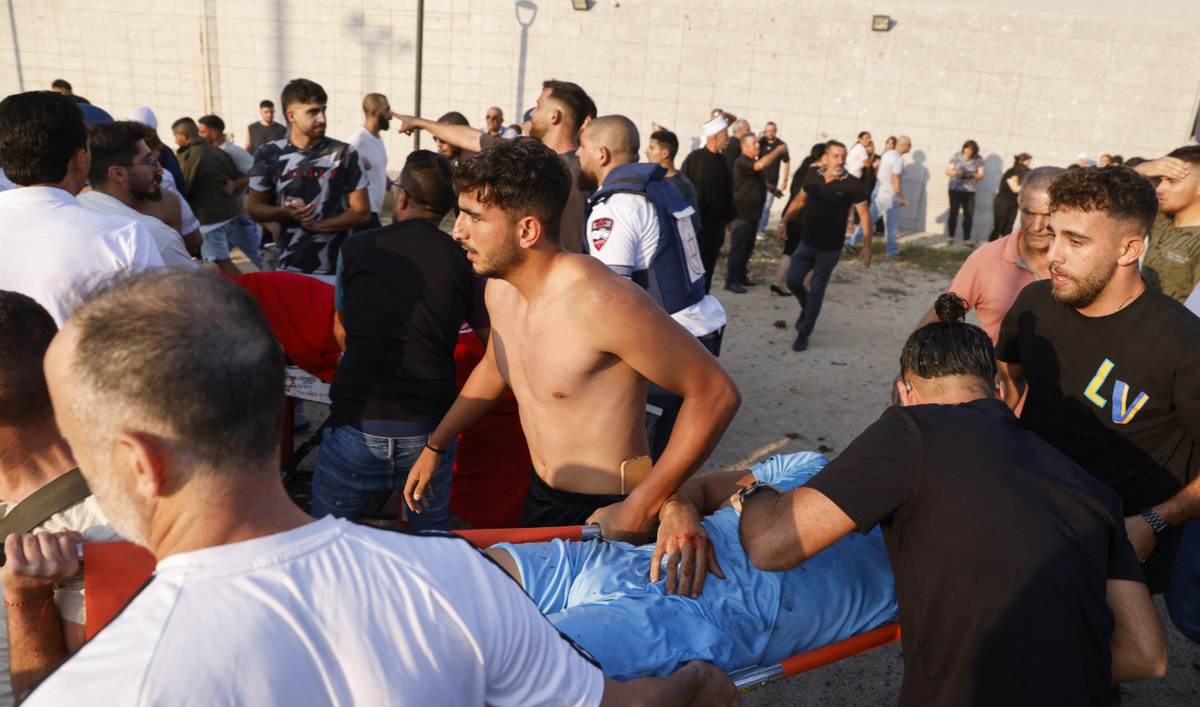
Israeli security forces and medical personnel evacuate casualties alongside local residents from the village of Majdal Shams in the Israeli-annexed Golan Territory on July 27, 2024. (AFP)
After the meeting, his office said, “Cabinet members have authorized the prime minister and defense minister to decide how and when to respond to the Hezbollah terrorist group.”
Galant, who visited Majdal Shams on Sunday, vowed to “hit the enemy hard” and raised concerns that the war in Gaza could escalate. Meanwhile, Iran warned Israel that any new military “adventures” in Lebanon could lead to “unforeseen consequences.”
The Israeli military called it the “deadliest attack on Israeli civilians” since cross-border gunfire began in October across the Lebanese border. The attack heightened fears that the hostilities, so far relatively contained, could escalate into all-out war.
Indeed, regional observers fear that a major Israeli retaliation for the attack could draw Hezbollah's Iranian-backed faction into the fray.
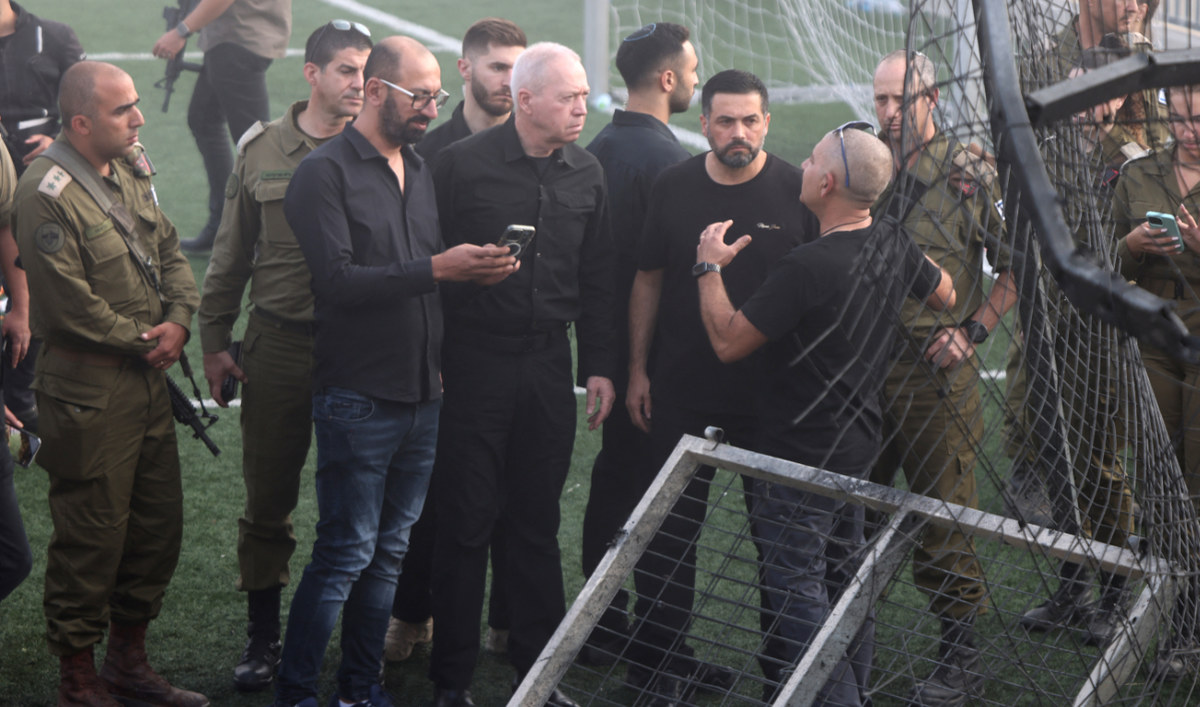
Israeli Defense Minister Yoav Galant (C) visits the site of a reported airstrike from Lebanon in the village of Majdal Shams in the Israeli-annexed Golan on July 28, 2024. (AFP)
“A strong Israeli response to Hezbollah could provoke further direct retaliation from Iran,” said Meir Jabedanfar, an Iranian-born Israeli Middle East commentator and scholar, after the rocket attacks.
As with previous escalations between Israel and Iran-backed opposing forces since the Gaza war began, the retaliatory actions have been relatively minor and carefully orchestrated, maintaining a deterrent effect without leading to a major confrontation.
But Firas Maksad, a senior fellow at the Middle East Institute in Washington, D.C., is under no illusions about the severity of the situation. “The risk of further miscalculation is higher than ever,” he said.
“A broader Israeli-Lebanon war is long overdue. A 'positive' scenario would see the coming offensive confined to areas of the two countries where populations are already heavily depleted.”
innumber
- 12 Children and teenagers were killed in a rocket attack on Saturday in Majdal Shams, an Israeli-occupied Golan Heights town.
- 527 At least 104 people, including civilians, have been killed on the Lebanese side of the border since Israeli-Hezbollah exchanges began in October.
- 46 According to the Israeli military, 22 soldiers and 24 civilians were killed on the Israeli side, including in the Golan Heights.
While the rocket attacks and subsequent Israeli retaliation could create a situation that could quickly escalate, Hague Ali of the Carnegie Middle East Center believes Hezbollah still wants to avoid all-out war.
“Hezbollah wants to avoid war and will show restraint depending on Israel's response,” he said. “Even if Hezbollah crosses the red line, it is likely to opt for a symbolic 'check the box' response.”
However, “the Majdal Shams attack demonstrates how difficult it is to maintain a geographically limited conflict for months. Mistakes and miscalculations are bound to happen and can escalate into conflict regardless of the will of the various parties to avoid it.”
Israel carried out its threat to retaliate by attacking the villages of Abashiya and Burj al-Shamali in southern Lebanon early Sunday morning. The two villages, adjacent to the city of Tyre, suffered significant material damage. Additional attacks were carried out on Tyre Harfa and Qiyam.
There were also airstrikes in Taraya, in central Bekaa, where two missiles destroyed a residential building. There were no reported casualties.

Smoke rises from the southern Lebanese border town of Kafr Killa, targeted by Israeli forces, on July 29, 2024. (AFP)
“Nobody wants a big war,” Kim Ghattas, a Lebanese journalist who lives in Beirut and writes for The Atlantic, wrote on X.
“Israel will strike key or highly visible targets in a concentrated nighttime strike or a week-long operation. The key is to avoid densely populated areas/civilian casualties and to avoid provoking a large-scale Hezbollah response and a wider war.
“It is very difficult to correct this. There are huge risks for Lebanon, the region and the Biden administration. So far, Israel has not called for additional settlement withdrawals in northern Israel, indicating that it believes Hezbollah’s response will be measured.
“All of this requires open channels of communication to ensure that no one misreads the other side’s moves. It’s a choreography of death, with all-too-real consequences for civilians everywhere.”
As tensions rose over the weekend, several Western countries issued statements urging their citizens to avoid non-essential travel to Lebanon and Israel, while several airlines suspended flights to Beirut.
A series of diplomatic efforts are underway to curb Israel's response following the attack.
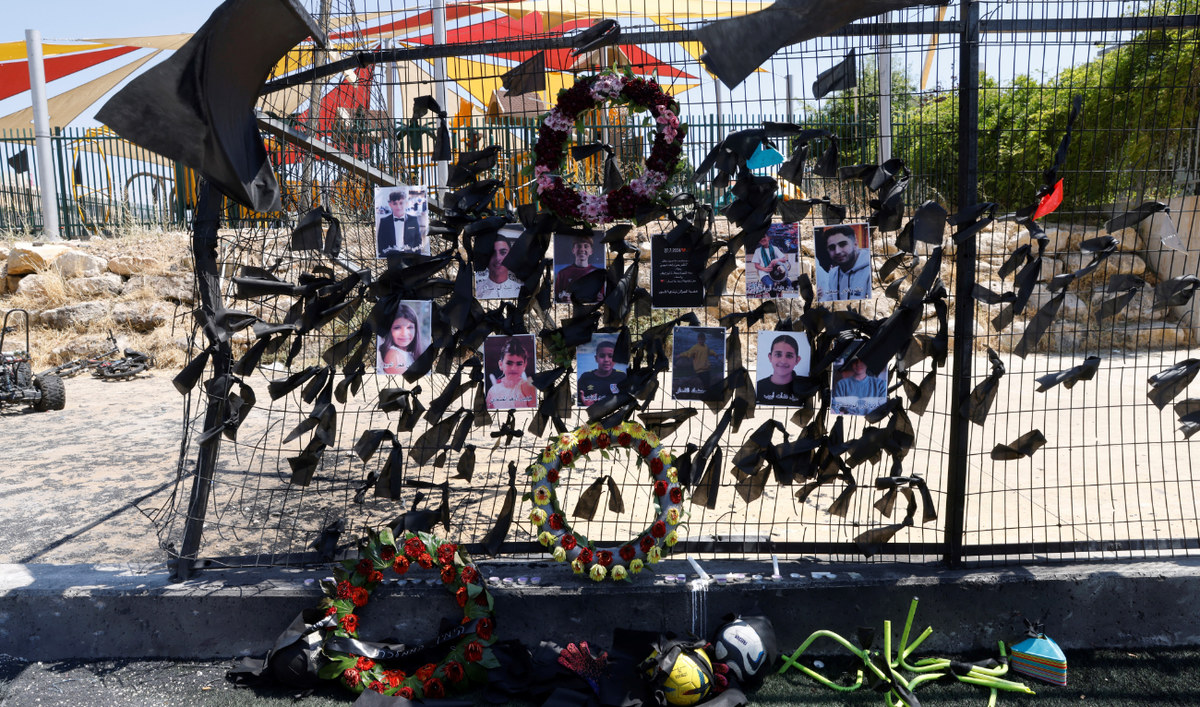
Portraits of children and teenagers who died hang on the fence of a soccer stadium where a rocket struck in the Israeli-annexed Golan town of Majdal Shams on July 29, 2024. (AFP)
The Lebanese government condemned all acts of violence and attacks on civilians. “Targeting civilians is a blatant violation of international law and goes against humanitarian principles,” it said in a statement, calling for “an immediate cessation of hostilities on all fronts.”
Lebanese Foreign Minister Abdullah Bouhabib told local broadcaster Al Jadeed late Sunday that the United States, France and others were trying to contain the escalation of the conflict.
“Hezbollah has been targeting military, not civilian, targets since the beginning of the war,” he said, adding that he did not believe the strike on Majdal Shams had taken place.
“It could have been done by another organization, it could have been an Israeli mistake, or it could have been Hezbollah's mistake. I don't know. We need an international investigation to find out the truth about this.”
Lebanese Prime Minister Najib Mikati said in a statement Sunday that talks were underway with “international, European and Arab partners to protect Lebanon and prevent further harm.”
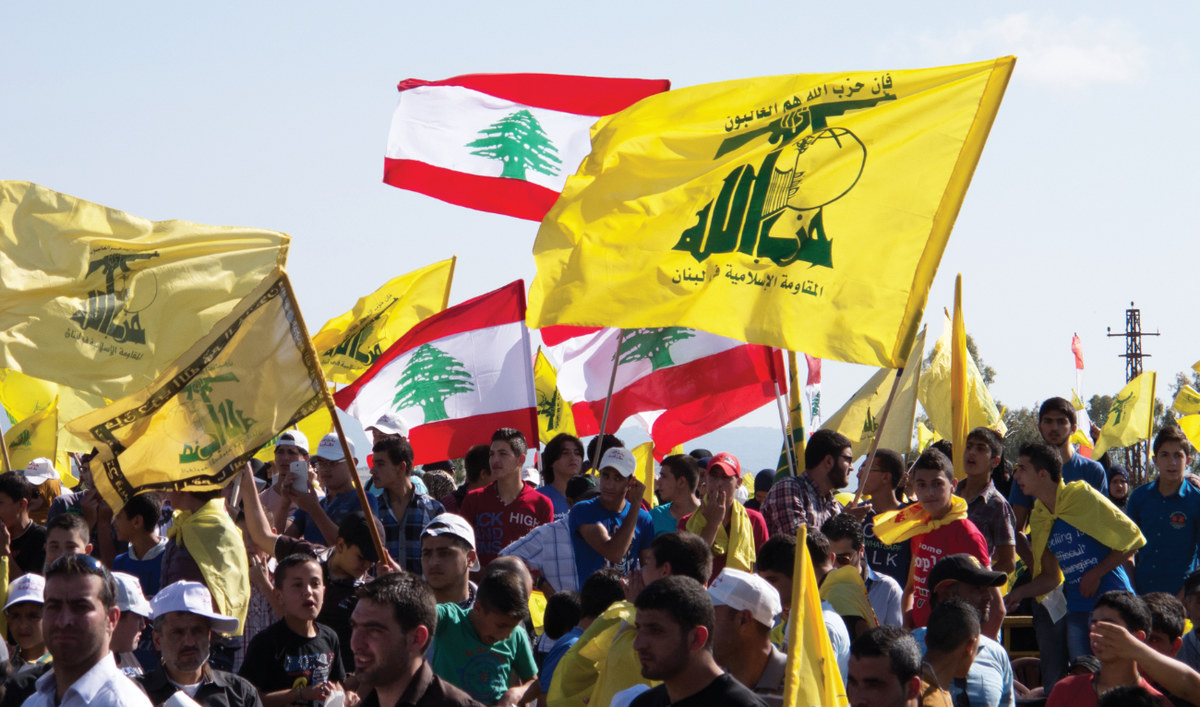
Hezbollah said there was “no connection” to the Majdal Shams attack, but confirmed it had fired such rockets at Israeli military targets in the Golan on Saturday. (Shutterstock)
Adrian Watson, a spokesman for the US National Security Council, said Washington had been in “continuous discussions” with Israel and Lebanon since the attack.
U.N. Secretary-General Antonio Guterres condemned the rocket attacks and urged all parties to “exercise utmost restraint.”
“Civilians must be protected at all times,” said a joint statement from UN Special Coordinator for Lebanon Janine Henis-Plashaart and Commander of the UN Interim Force in Lebanon Major General Aroldo Lazaro.
They urged “the parties to exercise maximum restraint and put an end to the intense and prolonged firefight that could spark a wider conflict and plunge the entire region into unimaginable catastrophe.”
Hennis-Plashard said he was in contact with Nabi Berri, the speaker of the Lebanese parliament, who is seen as a key channel of communication with Hezbollah.
“Lebanon and its resistance forces (Hezbollah) are committed to complying with Resolution 1701 and the rules of engagement not to target civilians,” Berri said in his statement. “The resistance forces' denial of what happened in Majdal Shams is a clear confirmation of these commitments and that Lebanon and its resistance forces are not responsible for what happened.”
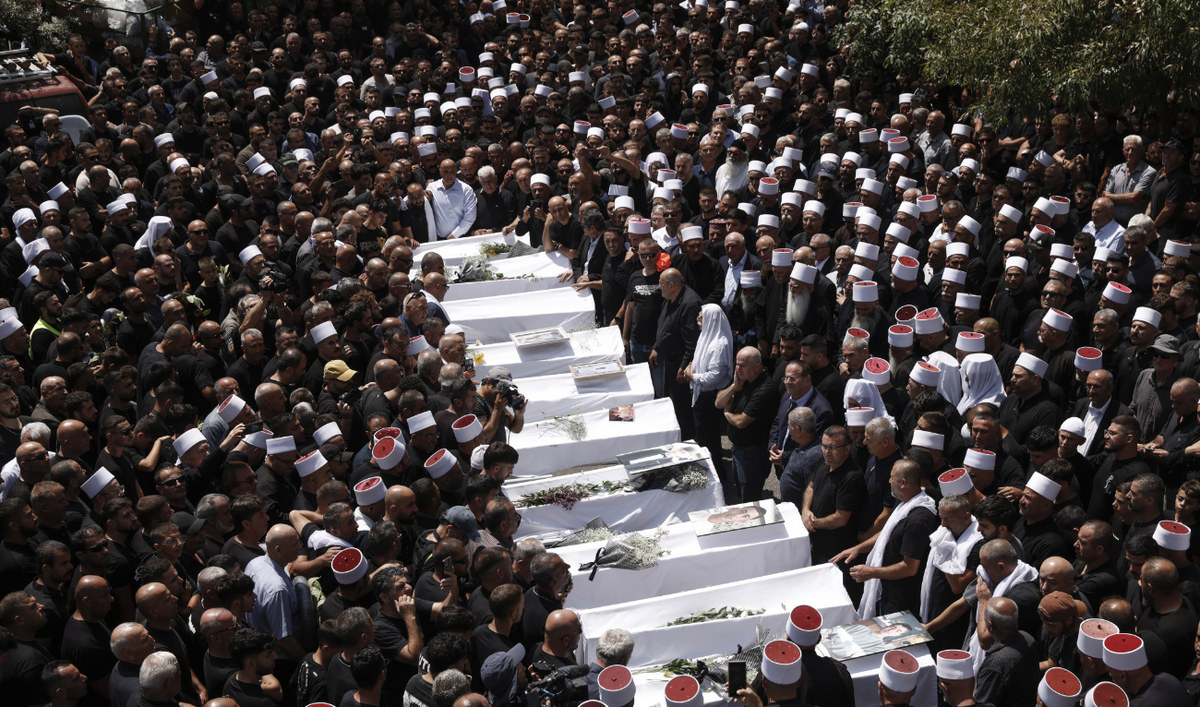
Mourners surround the coffins of 10 of the 12 people killed in Majdal Shams during a mass funeral in the Israeli-annexed Golan on July 28, 2024. (AFP)
Walid Jumblatt, an influential former leader of the Druze-based Progressive Socialist Party, said he received a phone call Saturday night from Amos Hochstein, U.S. President Joe Biden's special envoy, to discuss the incident.
Jumblatt urged both sides to exercise restraint and remain calm, reiterating the need to avoid civilian casualties. “Targeting civilians, wherever it occurs, whether in occupied Palestine, the occupied Golan or southern Lebanon, is unacceptable,” he said in a statement.
The fact that those killed in the Majdal Shams attack were Druze, not Israelis, is a complicating factor for Hezbollah, which has sought to improve relations with the religious group.
Many residents of Majdal Shams have not accepted Israeli citizenship since Israel captured the Golan Heights from Syria in 1967.
Israel, which conquered about two-thirds of the Golan Heights during the 1967 Arab-Israeli War, annexed the area in 1981, a move that has not been recognized by the international community, except by the United States, since 2019.
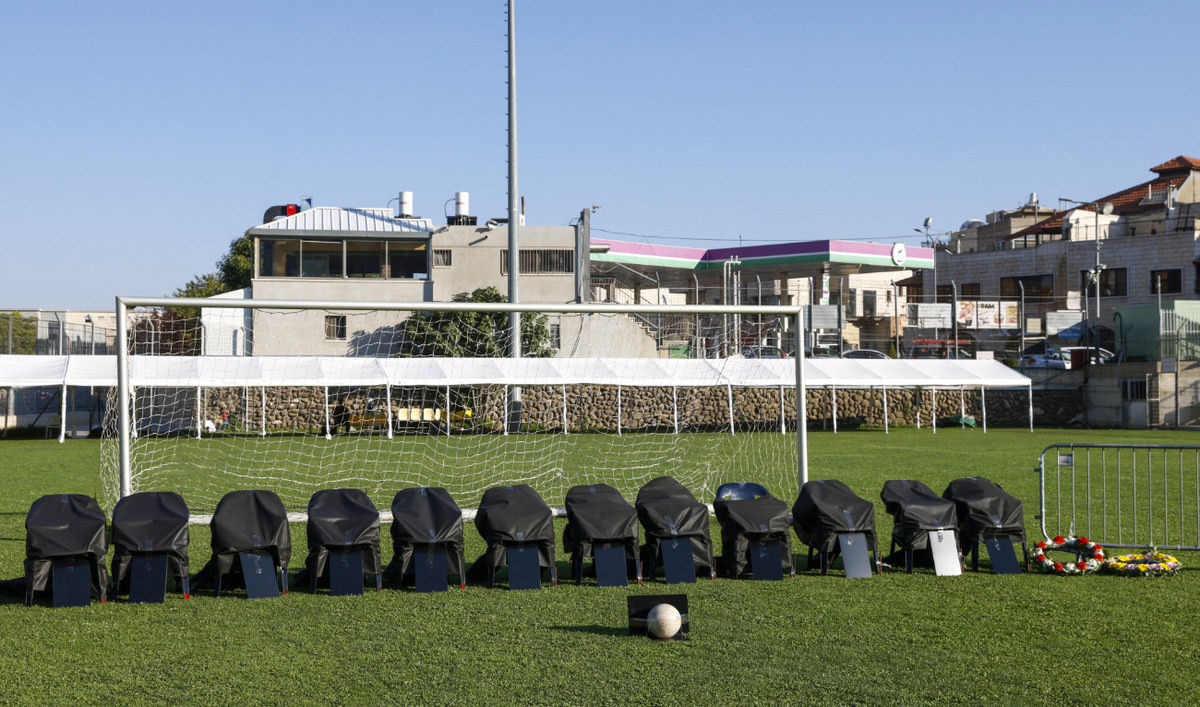
Black-covered chairs representing 12 members of the Druze community killed in a rocket attack in Lebanon line the soccer stadium where the attack occurred during a funeral in Majdal Shams on July 28, 2024. (AFP)
Golan Druze have residency status in Israel, but are generally considered Syrians. Members of the Syrian Druze community have resisted the Hezbollah-backed Syrian regime of Bashar Assad.
“The ‘justice’ for the war is particularly important to Hezbollah,” said Michael A. Horowitz, a geopolitical analyst and head of analysis at Le Beck International.
“If the attack in Mazdal Shams leads to war, they will have to justify their actions to the Lebanese people who will suffer greatly at the hands of Israel, and this will be particularly uncomfortable for them.
“Hezbollah wants to be seen as the defender of Lebanon. If a war breaks out because of attacks that kill villagers who do not identify themselves as Israelis, it will have a particularly bad effect on the group.
“This explains Hezbollah's denials, in addition to the sectarian dynamics. The story of how the war began is very important to the group.”

